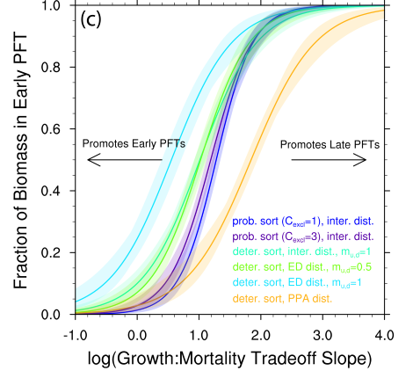The Science
Tropical forests are a critical ecosystem in governing terrestrial feedbacks to global change, and representing the complex ecological dynamics that determine these processes represents a crucial problem in Earth system models. We have developed the FATES model to explore and represent these dynamics, and are testing the model at tropical forest field sites to explore how the representation of plant traits and ecosystem parameters govern forest structure and function.
The Impact
This article represents a first benchmarking and parameter sensitivity of the full-complexity FATES model using multiple dimensions of plant trait variation alongside other ecosystem parameters. We find that the representation of competition fundamentally alters tropical forest function, and that parameters that control the dynamics of competition, such as disturbance rate and intensity, thus control ecosystem structure and function.
Summary
Tropical forests are a critical and dynamic ecosystem, but the ecological complexity of these regions are not represented in existing Earth system models. We have developed the FATES model for use in E3SM to address this. Here we test FATES within the E3SM Land Model (ELM) to explore how plant trait variation, and competition between different plant functional types at a tropical forest site, governs model predictions of the function and structure of the forest. Using a set of 12 plant traits whose variability we have observations of at that site, we use ensembles of model runs to explore both the trait variation, as well as how structural differences in the representation of competition, determine model outcomes, and compare these to observations at the site. Key findings are that adding larger numbers of competing plant types increases the productivity of the forest, and thus pointing to a need to better represent tradeoffs that prevent any one type from dominating an ecosystems; and that the balance between early successional and late successional functional types is highly sensitive to the representation of disturbance intensity, disturbance extent, and the degree of determinism in light competition by the trees, thus pointing to the need to focus on these processes in testing and benchmarking the model.

Contacts (BER PM): Dan Stover and Renu Joseph, Daniel.Stover@science.doe.gov (301-903-0289) and Renu.Joseph@science.doe.gov (301-903-9237)
PI Contact: Charlie Koven, Staff Scientist, Lawrence Berkeley National Lab, cdkoven@lbl.gov, 510.486.6724
Funding
NGEE-Tropics, DOE Early Career Research Program
Publications
Koven, C. D., Knox, R. G., Fisher, R. A., Chambers, J. Q., Christoffersen, B. O., Davies, S. J., Detto, M., Dietze, M. C., Faybishenko, B., Holm, J., Huang, M., Kovenock, M., Kueppers, L. M., Lemieux, G., Massoud, E., McDowell, N. G., Muller-Landau, H. C., Needham, J. F., Norby, R. J., Powell, T., Rogers, A., Serbin, S. P., Shuman, J. K., Swann, A. L. S., Varadharajan, C., Walker, A. P., Wright, S. J., and Xu, C.: Benchmarking and parameter sensitivity of physiological and vegetation dynamics using the Functionally Assembled Terrestrial Ecosystem Simulator (FATES) at Barro Colorado Island, Panama, Biogeosciences, 17, 3017–3044, https://doi.org/10.5194/bg-17-3017-2020, 2020.